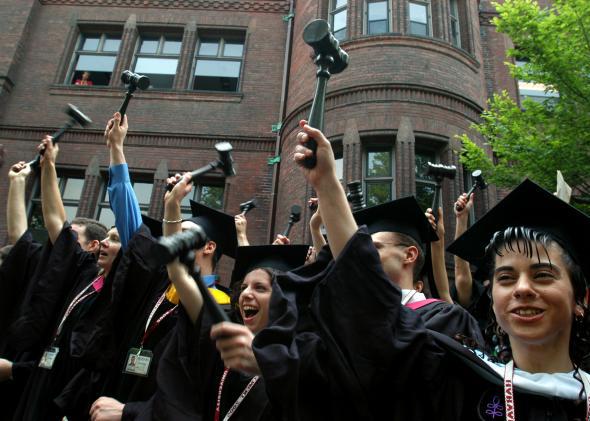I’ve argued before that the federal government should charge graduate students as much as it can get away with for their student loans, because people with advanced degrees tend to be very well off. In practice, that means setting interest rates a bit below whatever the private sector can offer, so that banks don’t swoop in and steal the Department of Education’s customers.
Well, there are some signs that Washington might (possibly, potentially) need to think about giving America’s aspiring highly paid professionals a price break. As Bloomberg reports, a number well-funded startups are beginning to target grad students for loan refinancing, offering rates far below the feds’. Here’s how the piece kicks off:
Chris Winiarz, a 31-year-old money manager with a Northwestern MBA, jumped at a student-loan deal of a lifetime.
A startup called SoFi offered to refinance his $45,000 in federal debt, slashing his interest rate to 2.69 percent from 6.55 percent. Winiarz will pay off his obligation three years early, saving about $9,500 and helping pay for an engagement ring for his girlfriend. The company even threw in a free bottle of artisan olive oil.
“I really should have done this a lot sooner,” said Winiarz, who helps oversee the University of California’s endowment and pension investments.
(A little bit of further context: Right now, new PLUS loans for grad students are carrying a 6.84 percent interest rate.)
Companies like SoFi are a potential problem for the government because the Department of Education makes the vast majority of its student loan profits from graduate students (the rest, on net, come from lending to the parents of undergraduates). That’s because, while there are certainly plenty of horror stories out there from underemployed and overindebted law grads and Ph.D.s, advanced degree holders are generally high earners who rarely default. Their reliable payments help subsidize lending to low-income undergrads, who are generally far less of a solid bet for the government.
Which is why it probably shouldn’t be surprising that some financial services firms are making a play for them. A New York company called CommonBond says its typical client is “a 32-year-old who makes $140,000 annually and has a near-perfect credit score of more than 760.” That’s pretty much as close to a sure investment as one typically gets in consumer lending.
While Bloomberg suggests that these companies could soon blow a multibillion-dollar hole in the feds’ student-lending balance sheet, I think it’s a bit early for anybody to freak out. The little part of me that still believes in efficient markets feels like private student-loan giants like Sallie Mae and Wells Fargo would already be doing more in this space if it had vast untapped potential. Second, even if lenders manage to make money picking up a few aspiring 1 percenters, the government’s budget math might still be better if it lets them go and keeps interest rates where they are. The trend only becomes really perilous if these lenders reach beyond truly elite grads, and start diverting average MBAs, J.D.s, and whatnot.
And of course, these are startups we’re talking about here, which means this could all just be hype. Check back in three years. If they’re still making money, then maybe it’s time to worry.
(Hat tip to Seton Hall Law Professor Michael Simkovic).
